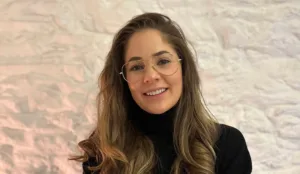Neelam Shahbazi is Managing Partner, Capabilities at Finecast, GroupM Nexus’s addressable TV solution. She has over ten years experience in the media tech industry. Prior to Finecast, she held roles at a range of businesses including Amazon, Channel 5 and Paramount International, where she was VP of Product and Operations.
What is the biggest opportunity for women in your sector of the digital industry today?
Women in the digital industry have great potential. I think it’s crucial to point out – what makes women extremely powerful is the fact that we are empathetic, aware and can think laterally and deeply across numerous different and, often, complicated subject matters quite quickly. It helps us communicate with a range of stakeholders, striking the right chords with clients, partners, and colleagues.
Personally speaking, what’s worked for me is having a deep understanding of technology – diving deep into a complex problem and then elevating the solutions and outcomes to drive change. Additionally, I would say women can cut through difficult conversations with data in an empathetic, emotional way.
These traits place us in a privileged position not only to enter a sector as competitive as the digital industry but to be recognised for the value we create.
What is the biggest challenge to you as a woman in the digital industry and how are you overcoming it?
One of the biggest challenges for women is ‘opportunities.’ We need to acknowledge that the digital landscape has changed over the past 15 years, especially when it comes to diversifying in hiring, and upskilling and training for women. It’s great to see that there are many more women in tech today, but we have to fight, work and push a lot harder.
Diversity and inclusive culture are helping grow that ambitious, tenacious culture and reinstating that women can do anything that anyone else can do. Additionally, the juggling act between a career and family life is demanding. Businesses should encourage women to have it all.
What three things could employer companies do to make the digital industry better for women?
Firstly, businesses should provide more training programmes tailored to women. Nurturing talent and ensuring real diversity in terms of both gender and race, is crucial. I believe companies should do more in this respect.
Second, businesses need more diverse leadership teams with more women in top roles. This encourages and helps more women to come into the business and helps them understand that there is an opportunity to grow.
Lastly, businesses should be flexible and supportive of nurturing women into leadership roles and providing work-life balance.
What support structures and organisations are most important and effective to you as a woman in the digital industry?
The keywords are ‘flexible work’ and ‘trust.’ Having a strong structure in terms of flexible working, understanding and trusting that tasks will be completed, and jobs will be carried out, is crucial. By establishing flexible working models, companies can support women effectively and promote a clear work-life balance that enables us to juggle our numerous professional and personal commitments.
Mentoring schemes can also be instrumental in championing the role of women in the digital industry, but more structured and tailored programmes are needed. With the right structures in place, it is possible to unlock transformational change within an organisation.
What is the biggest misconception about women and by women in the digital industry?
I don’t feel there’s a misconception that women are threats to each other. If anything, women look to each other for inspiration and support and to learn different styles of leadership that work for them. In the digital industry, I’ve had the privilege of having incredible women leaders, which has taught me how to support and empower my teams and colleagues.
There need to be more women in these positions supporting, nurturing, and elevating each other.








